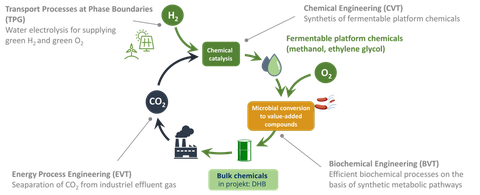ESF-Plus Junior Resarch Group CARBONCYCLE
Table of contents
CARBONCYCLE (Innovative biochemical processes for the industrial utilization of CO2)
The European Union offers a variety of funding programmes to support research and education as a valuable public good. Our project was funded by the European Regional Development Fund (ERDF).
Brief description
Efficient, industrially relevant strategies for the use of CO2 must be developed in order to halt the rapid progress of climate change. Although it is already possible to reduce CO2 to basic chemicals with the help of hydrogen, the industrial implementation of these processes fails due to the low value added of the products compared to the costs of the processes. In the present project, this problem is to be solved by a coupled biochemical synthesis of higher-value products and the targeted removal of technical barriers.
In order to be able to cover the entire process chain from CO2 to the product, an interdisciplinary group of junior researchers has been established, whose members have all the necessary skills to work on and coordinate the individual process steps. The young researchers can rely on the existing know-how of the chairs for Energy Process Engineering (EVT), Transport Processes at Interfaces (TPG), Chemical Process Engineering (CVT) and Bioprocess Engineering (BVT) at the Technical University of Dresden and are closely supervised by the specialists working there.
The performance of the process approach will be demonstrated using the synthesis of 2,4-dihydroxybutyrate (DHB) as an example. DHB is an extremely versatile basic chemical. Its main application is the synthesis of the methionine analog HMTB, which is currently produced exclusively from fossil resources with an annual production volume of 1.2 million tons. DHB is also being intensively researched as a new monomer for the production of innovative biopolymers. Due to the additional OH-groups, DHB-halogenated copolymers are hydrophilic and thus promise improved biodegradability as well as interesting mechanical properties (through controlled linkage of the OH-groups). The development of biochemical production processes for DHB will also make a significant contribution to reducing the use of fossil resources and to the production of highly innovative biopolymers.
Project duration
Period: 01.01.2024 – 31.12.2026
Project partner
TUD internal project partners
Chair of Bioprocess Engineering (Project lead)
Chair of Transport Processes at Interfaces
Chair of Chemical Process Engineering
Chair of Energy Process Engineering
Contact
 © Ritz
© Ritz
Prof. Dr.-Ing. Thomas Walther
Send encrypted email via the SecureMail portal (for TUD external users only).

